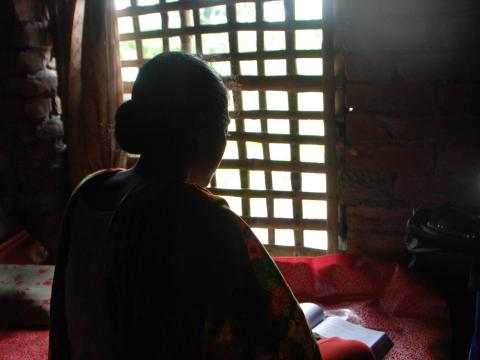Bordering on a nightmare

It all happened so quickly.
One minute she was safe in her Bangladeshi village and the next she was waking up in a strange and scary room after being drugged and dragged across the border. This is the story of Moni’s terrifying experience and how World Vision is helping the teenager return to normal life after her community fought to get her home.
“It was Friday when it happened. My mum was out, so I went to the playground and was hanging out there when this man came over and started talking to me."
“He was asking about my family and when I told him that my parents were divorced and I lived with my mum, he offered me a job in Dhaka."
“I told him to talk to my mother about it, but he said not to tell her anything. That made me suspicious, so I began walking home – but he grabbed my hand and forced me onto his motorbike before covering my mouth with a handkerchief."
“That was the last thing I remember until I woke up in a strange room. The door opened and a woman came in. She saw me crying and I asked her where I was, so she told me: India.”
Moni* couldn’t stop shaking as she described the fateful day two years ago when a trafficker kidnapped her, forcibly deporting the then 15-year-old from her home in Satkhira, Bangladesh to India. Satkhira is a district in the south-west that given it shares a border with the Indian state of West Bengal is a trafficking hotspot out of the country.
He grabbed my hand and forced me onto his motorbike before covering my mouth with a handkerchief.
Human traffickers prey on vulnerable young people who are orphans or belong to single-parent families. Moni’s father divorced her mother, Rani*, when his daughter was only three months old, cutting off all financial support after the separation.
With her relatives living in poverty and not having any money to lend, Rani had no option but to move into her sister’s house, which her sibling already shared with their frail, elderly mother. This was not ideal, however, with Moni’s home life leading to frustration and hardship, especially when there wasn’t enough food.
The newly single mother accepted any jobs she could to provide for her daughter, working on a day-to-day basis on a neighbor’s farm and in road construction. But despite her willingness to do such physically stressful work, Rani could only earn a daily average of 1.25 US dollars, which wasn’t enough to support her small family.
Rani says, “I’ll never forget those days when I had to leave my three-month-old daughter at home to find work. I couldn’t stay with her even when she was ill.
“Not much changed as she got older, so Moni often wandered around waiting for me to come home. That’s why the trafficker saw her as an easy target. I was such a bad mother!”
When she realized her daughter was missing, Rani looked everywhere and asked everyone. She recalls, “Luckily, a few people had noticed and knew the man talking to Moni that day, so a group of us went to his house – but he wasn’t there, so I called the police and prayed for her rescue.”
But the locals weren’t prepared to wait, taking the law into their own hands. As word spread of Moni’s abduction, an angry mob formed to storm the suspected trafficker’s home – and this time he was in.
The enraged villagers beat the suspect ferociously, forcing him to confess to his crime. With the mob keeping him locked up, he had no choice but to call his collaborators and plead for them to bring Moni back, which they did the next morning.
When local people informed the police that Moni was safely back home, they went to the village to arrest and charge the suspect with kidnap and trafficking.
Of her brief, but horrifying experience in India, Moni says, “I couldn’t stop crying thinking that I’d never see my mum again, so one of the women in the house took pity on me and helped me hide in another location.”
When local people informed the police that Moni was safely back home, they went to the village to arrest and charge the suspect with kidnap and trafficking. Currently, the individual is in custody as he awaits the court’s verdict on his case.
Moni was out of immediate danger, but she and her family still needed help, so community leaders contacted World Vision to include the girl in its Child Safety Net Project.
After identifying the family’s dire need for economic assistance, World Vision’s local team gave them a young cow and some cloth for Rani to sell door-to-door.
Rani says,“I’ve sold almost all of the cloth now and have a decent profit to buy more stock. I can spend a lot more time with Moni, too.”
Reintegration into mainstream society is a huge issue for children involved in trafficking, especially for girls who often suffer the stigma associated with the crime. And if a female victim of trafficking returns with a sexually transmitted infection, her life will be extremely challenging if her community ostracizes her and her family.
World Vision’s counseling support, which tackles this issue, minimized the stress Moni underwent after her rescue, allowing her to resume her college studies.
She says, “I want to finish university and join the civil service, either in health or education. So I’m very happy that World Vision will help me with my education because my mum wouldn’t be able to afford it on her own.”
*Names changed to protect identity
Story & photos by Lipy Mary Rodrigues